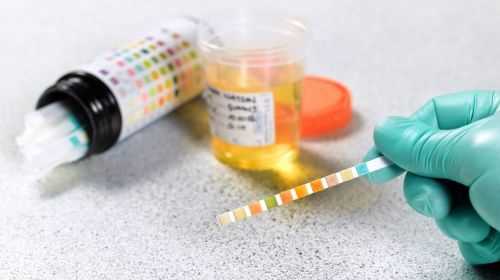The urge to urinate is a normal signal from the body when the bladder is full. However, if it occurs very frequently – including with urination – this can be an indication of a disorder. Possible causes of constant need to urinate and what can help.
Frequent urination is not only a nuisance, it can also be a sign of a serious illness. These are the causes behind it.
At a glance:
How is the urge to urinate triggered?
Urine or urine is extracted from blood in the kidneys through a complex filtration process. Important blood components are retained in the body, while excess substances such as water, salts and minerals, various metabolic products and some toxins are separated off and reach the urinary bladder via the ureters. From there they are excreted in a controlled manner.
The urge to urinate occurs when the bladder is full and this varies from person to person. The urge to urinate is triggered by nerves in the bladder wall and in the bladder obstruction. You report to the Gehrin that the bladder’s storage capacity has largely been exhausted and that the bladder should be emptied.
Decisive for normal bladder function or a normal urge to urinate are the correct reporting of the filling level of the bladder to the brain, the proper function of the bladder occlusion and the contracting muscles of the bladder wall as well as the voluntary control of the bladder emptying. Therefore, the urge to urinate should not be suppressed too often, because this can weaken the muscles.
How often is the urge to urinate normal?
The body normally produces around 1.5 liters of urine per day. In adults, urination occurs approximately every four to six hours during the day. During the night, the urinary bladder serves as a reservoir for urine, so that sleep usually does not have to be interrupted to pass water.
The urge to urinate usually occurs when the bladder is about half full. The bladder of women tends to be smaller than that of men and has a different spatial location. The capacity of the bladder is between 250 and 500 milliliters, but it is individually dependent on body size and other factors.
How often a person has to go to the toilet also depends on their age. Babies wet about 20 times a day, children between one and two years about twelve times, between two and three years about ten times. The professional association of paediatricians (BVKJ) recommends that children between the ages of four and twelve should empty their bladder about seven times a day.
It is advised not to delay or suppress going to the toilet so that the child does not forget how to open and relax the sphincter muscle. This is to prevent a bladder emptying disorder. From the age of twelve, about four to five visits to the toilet to empty the bladder are normal.
Forms of frequent urination and urination
Deviations from the normal urge to urinate can manifest themselves in different ways. In medical terminology, the following terms are used for the complaints:
- Polyuria: Excretion of significantly more than 2 liters of urine per day
- Pollakiuria: frequent urination in small amounts
- Anuria: Failure to pass urine (less than 100 milliliters per day)
- Alguria: Painful urination
- Nocturia: nocturnal urination
Causes of frequent urination
An increased urge to urinate is a phenomenon that occurs when you drink large amounts – for example after sweating profusely. But it can also be due to diseases that lead to irritation of the bladder nerves. In this case, incorrect information about the bladder filling level is passed on to the brain. This creates an urge to urinate, although there may be little urine stored in the bladder. With some diseases, the associated urge to urinate occurs so suddenly and severely (imperative urination) that the bladder sometimes empties before a toilet can be reached (urge incontinence).
The causes of frequent urination may just as well be harmless. Pregnant women suffer from it, for example, because the growing uterus is pressing on their bladder.
An increased urge to urinate is a symptom that can be attributed to the following causes, for example:
- large amounts of drinking
- Diseases that cause increased thirst – like diabetes
- Bladder dysfunction
- Inflammation
- Urinary stones
- psychologically stressful situations such as fear, excitement or stress
In detail, the causes of frequent urination can be distinguished as follows.
Causes of frequent urination with painful urination (small amounts of urine):
Causes of frequent urination with painless urination:
- Enlargement of the prostate: only weak urine stream, incomplete emptying of the bladder
- Glomerulonephritis: inflammation of the kidney cells, blood in the urine
- increased thirst: for example as a result of diabetes insipidus. The latter is a hormonal disease in which there is an extremely increased urine excretion because control signals for the recovery of water from the urine do not reach the kidneys or do not work there. The disease is accompanied by an extreme feeling of thirst and enormous amounts of drinking.
Other causes of constant need to urinate can be:
- Use of water tablets (diuretics) or other medicines
- in women: uterine sagging, weakness of the pelvic floor muscles, pregnancy
- Heart failure: During the day, water is stored in the body in edema, which is excreted at night and can lead to an urge to urinate at night.
- Urinary incontinence (Urge incontinence): Sudden need to urinate, when going to the toilet cannot be postponed. Often a few drops of urine will come out before going to the toilet.
- A bladder tumor (carcinoma of the bladder) can cause a constant urge to urinate.
Frequent urination at night – what’s behind it?
Usually the bladder is able to hold urine overnight. Nocturnal urination is therefore usually the exception – for example after an increased fluid intake in the hours before going to bed. Frequent urination two or more times a night is a symptom that could suggest various causes and should be evaluated by a doctor. In men, for example, the cause can be a benign enlarged prostate. But hormonal disorders are also among the possible causes.
The German Society for Urology e. V. (DGU) emphasizes that nocturia is a common ailment in both women and men. However, although this symptom affects many people, the consequences are often underestimated: “In the population, nocturia is often mistakenly dismissed as an unavoidable symptom of old age, primarily in men, although the individual causes need to be clarified,” explains Prof. Dr. Kurt Miller, President of the German Society for Urology eV (DGU).
Frequent Urination – A Warning Signal For Diabetes?
Excessive urination, along with other symptoms such as intense thirst, is a symptom of diabetes mellitus. The reason: the body tries in this way to excrete the excess glucose, i.e. sugar. In these cases, the urge to urinate is increased even if there was no previous intake of fluids: those affected excrete large amounts of fluids even though they have only drunk a little before.
In type 1 diabetes, the symptom mainly occurs at a young age. Parents should therefore seek medical advice if their children have complaints. In addition to frequent urination, symptoms such as
In type 2 diabetes, frequent urination is less of a reason for diagnosis: Here, the disease is often only recognized after years, when secondary diseases already exist.
Diagnosis: Clarification of the causes of frequent urination
When diagnosing the urge to urinate, a few questions are first clarified during a conversation (anamnesis). Information on the frequency of urination, the amount of excretion, the need to urinate at night, pain, feeling thirsty or taking medication can provide clues to the cause.
It is also important to differentiate whether the symptoms are acute or have existed for a long time. An elimination log, in which the time, the amount of urine and peculiarities such as pain or (visible) blood in the urine are recorded, can help to describe the urge to urinate more precisely.
Blood and urine tests can then be done. In particular, blood sugar, kidney function (creatinine value) and various hormone values as well as changes that indicate infections are determined.
The kidneys, bladder and neighboring organs are then examined using ultrasound. In this way, urinary stones, an enlarged prostate or the respective filling level of the bladder can be recognized. The heart function can also be recorded with ultrasound. If there is suspicion, x-rays can be used to detect ureteral stones and special examinations such as urine flow measurements can be used to confirm a diagnosis.
How is frequent or nocturnal urination treated?
The treatment of the urge to urinate depends on the cause of the symptoms: For example, treat bladder infections, remove urinary stones or correct hormonal disorders. In the case of constant urination as a result of urge incontinence, special training can help delay going to the toilet and get the bladder used to increasingly larger amounts of filling (toilet training).
Smaller urinary stones that have already entered the bladder can in many cases be eliminated naturally. Larger bladder stones and stones that are stuck in the ureter are either crushed by urologists in the course of a bladder and ureteroscopy or shattered by sound waves from the outside (extracorporeal shock wave lithotripsy – ESWL).
Hormonal disorders are usually treated with medication. If diabetes mellitus is present, adequate control of the blood sugar level is necessary.
If damage to the kidneys is hidden behind the constant urge to urinate, the focus is on supporting the kidney function. For example, increased blood pressure, which is particularly harmful to the kidneys, is lowered and elimination is supported by diuretic drugs.
Surgery is often necessary if, for example, an enlarged prostate or a uterine sagging triggers frequent urination. In the case of a sudden urge to urinate and involuntary urine loss as a result of urge incontinence as a form of urge incontinence, targeted bladder and pelvic floor training may be necessary. Special incontinence products provide security and can help to improve the quality of life.




